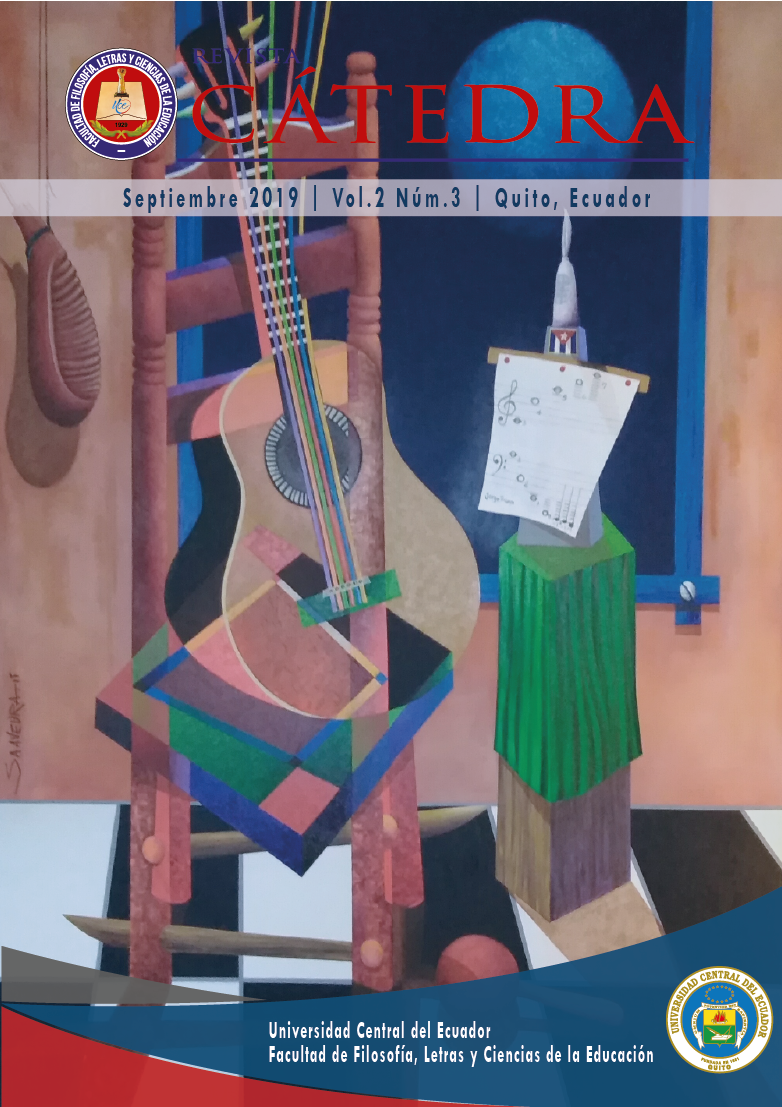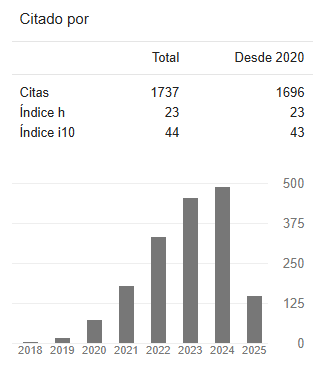Perception of educational actors about the use of mobile devices: A case study
DOI:
https://doi.org/10.29166/catedra.v2i3.1833Keywords:
learning, mobile devices, perception, tabletsAbstract
The implementation of innovative methodologies related to the use of digital resources has allowed a relevant participation of educational communities. This article provides the views of the students and teachers of an educational institution benefiting from the Mobile Digital Classroom Project executed by Fundación Telefónica, part of the Profuturo Project and articulated with the Ministry of Education of Ecuador. The research aims to determine the perception of teachers and students in relation to the educational use of mobile devices. The inductive method was used, thus, the starting point was the data provided by the 70 children of school age and 10 teachers to perform the construction of the categories.
75% of the participants of this research associate the use of the mobile device with learning, also referring to the learning acquired in a fun way. In addition, they mention that the tablet allows them to access information, to know other cultures, to enable research, which generates significant learning.
The mobile device within the classroom achieved positive results in the learning processes, all participants perceive and value the resource as positive, they assume it as a bridge that brings them closer to the knowledge of other cultures, gives them the possibility to investigate, to learn values, content of topics and access to reading.
Downloads
References
Arancibia, M., Cosimo, D., & R, C. (2018). Percepción de los profesores sobre integración de TIC en las prácticas de enseñanza en relación a los marcos normativos para la profesión docente. Ensaio: aval. pol. públ. Educ, 26(987), 163-184,.
Ausubel, D. (2002). Adquisición y retención del conocimiento: una perspectiva cognitiva. Barcelona: Paidós.
Badia, A., Chumpitaz, L., Vargas, J., & Súarez, G. (2016). La percepción de la utilidad de la tecnología conforma su uso para enseñar y aprender. Revista Iberoamericana de educación, 18(3).
Berenguer, C. (2016). Acerca de la utilidad del aula invertida o flipped classroom. Alicante: Universitat d’ ALacant.
Colmenero, J. (2014). Procesos psicológicos básicos. Madrid: MC Graw Hill.
Fundación Telefónica. (11 de Octubre de 2017). Fundación Telefónica. Recuperado el 5 de Febrero de 2019, de ProFuturo llega a Ecuador para innovar la educación: http://fundaciontelefonica.com.ec
Fundación, T. (10 de 01 de 2018). Telefónica, Fundación. Recuperado el 31 de 01 de 2019, de Profuturo: http://fundaciontelefonica.com.ec/innovacion-educativa/profuturo/
Jaramillo, P. (2005). Uso de tecnologías de información en el aula. Revista de Estudios Sociales(20), 27-44.
Leiva, J. (2008). Interculturalidad, gestión de la convivencia y diversidad cultural en la escuela: un estudio de las actitudes del profesorado. Revista Iberoamericana de Educación, 46(2), 1-14.
MINEDUC. (16 de Mayo de 2018). Textos escolares y lectura en el sistema educativo. Recuperado el 6 de Febrero de 2019, de Textos escolares y lectura en el sistema educativo: https://educacion.gob.ec/textos-escolares-y-lectura-en-el-sistema-educativo/
MINEDUC. (23 de 06 de 2019). Ministerio de Educación. Recuperado el 31 de Enero de 2019, de Memoria. Festival de la Innovación educativa.: https://educacion.gob.ec/memorias-documentos/
MINEDUC. (31 de Enero de 2019). Vuelven a las aulas el maestro, los valores y la alegría. Recuperado el 6 de Febrero de 2019, de Vuelven a las aulas el maestro, los valores y la alegría: https://educacion.gob.ec/vuelven-a-las-aulas-el-maestro-los-valores-y-la-alegria/
Ministerio, C. y. (6 de Febrero de 2019). Plan Nacional del Libro y la Lectura José de la Cuadra. Recuperado el 6 de Febrero de 2019, de Plan Nacional del Libro y la Lectura José de la Cuadra: http://oei.org.ar/new/wp-content/uploads/2018/03/PNPLL-Ecuador.pdf
Ospina, J. (2006). La motivación, motor del aprendizaje. Ciencias Salud, 158-160.
Ossa, J. (2005). Educar es enseñar a indagar. La investigación como procesos de formación. Educación, XXVIII(3), 525-533.
Papalia, F. (2012). Desarrollo Humano. México: Mc Graw Hill.
Silva, I., Borrero, A., & Marchant, P. (2006). Percepciones de jóvenes acerca del uso de las tecnologías. Juventud, educación, 14(24).
Vargas, L. (2004). Sobre el concepto de la percepción. Alteridades, 4(8), 47-53.
Downloads
Published
Versions
- 2020-09-03 (2)
- 2019-09-27 (1)









